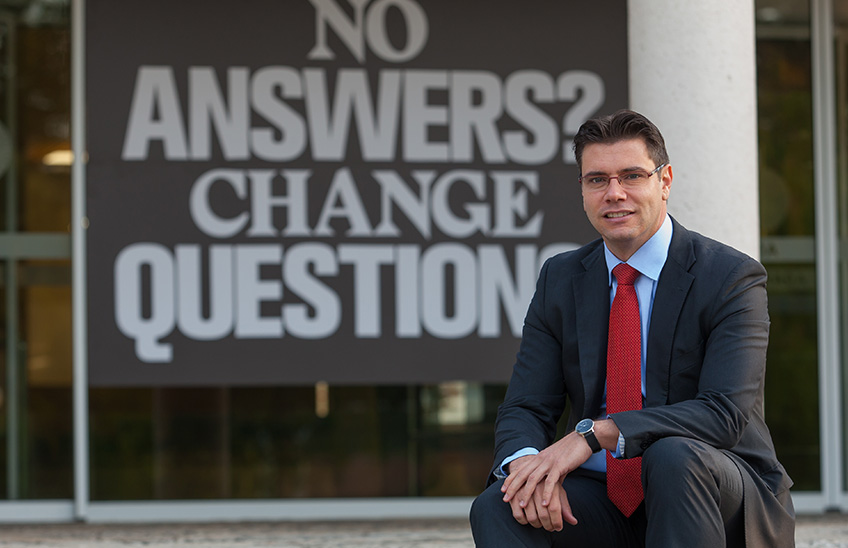Alejandro N. García: "It is essential to come up with a question or challenge that can be used for reflection by student"

Alejandro N. García is Professor of Sociology and, together with other professors of Degree at Philosophy, Politics and Economics (PPE), coordinates the activities of the integrated project PPE-Insights.
Your class is divided into teams representing the parties in the European Parliament. Each group must take a different position on a single question: Is the Welfare State sustainable? They must do so from three different perspectives: philosophical, political or economic, depending on the subject they are currently studying, and provide a report and statistical analysis of the different profiles of European society.
Students recognize that the exercise serves to deepen their understanding of the different ideological currents, develop communication skills and learn to listen to ideas that are different from their own. They can put everything they have learned on internship at each new discussion.
Q. Where did the idea for this project come from?
It arises from the interdisciplinary nature of the MPE. In order to train students, it is necessary to guide them with learning methodologies in which they can bring together concepts and ideas from the areas involved in an integrated project . With projects like this subject it is possible to provide a more holistic and applied educational experience, reflecting the complexity and interconnectedness of contemporary challenges.
At its core, the entire project PPE-Insights, starts from the premise that understanding complex problems requires an interdisciplinary perspective, integrating knowledge from Philosophy, policy and Economics. Moreover, it is inspired by the desire to prepare students for real roles and practical challenges they will face in their future careers.
Q. What do these initiatives mean for the student's training ?
They offer a more robust and meaningful training by enabling students to apply theories and concepts in practical, real-world contexts. By working on projects that simulate real-world situations or address current challenges of contemporary societies, such as the sustainability of the welfare state, they develop critical skills such as analytical thinking, problem solving, team work and effective communication. They carry out debates and presentations where they expose and defend their ideas, combining the knowledge acquired in the classroom with the research they have made about their political position. They also reinforce their written skills, with reports or data analysis. In addition, these experiences help them better understand the impact and applicability of their academic programs of study in society and prepare them for their transition to the working world.
Q. Why is it important and necessary to innovate in classroom? What are the keys to achieve it?
The question that we teachers constantly have to ask ourselves is how we can improve the training of our students in the classroom and with what methodology it would be achieved in an optimal way. This reflection sometimes leads to consider and implement new methods of teaching that can help the learning process to achieve its objectives.
It is true that it is not always easy: implementing these new methodologies requires significant preparation and coordination efforts. To begin with, it demands from teachers an ability to think of their teaching in a different way: the base unit is no longer - or not only - the subject they teach, but the course and the subjects that students are seeing in parallel. For the teacher, the idea of "my subject" as an isolated and self-sufficient reality is blurred, and he/she has to think about the training of the student with a broader perspective and in coordination with his/her colleagues. On the other hand, finding a question or challenge that can serve as a guiding thread for the reflection of student and the connection between knowledge and subject is also an essential element... which is not always easy to define or agree upon.
Q. What impact does this project have on students and, ultimately written request, on society?
The impact of this subject of project on students is multifaceted: it enhances their engagement and understanding of social and political issues, refines their analytical and communication skills, and increases their preparation for careers in fields related to politics, critical thinking, and Economics. In the long run deadline, this subject of Education contributes to the training of well-informed citizens skilled in addressing and solving complex problems in society. By fostering an interdisciplinary and reflective approach , this project financial aid to prepare leaders or decision makers who can positively impact society.
